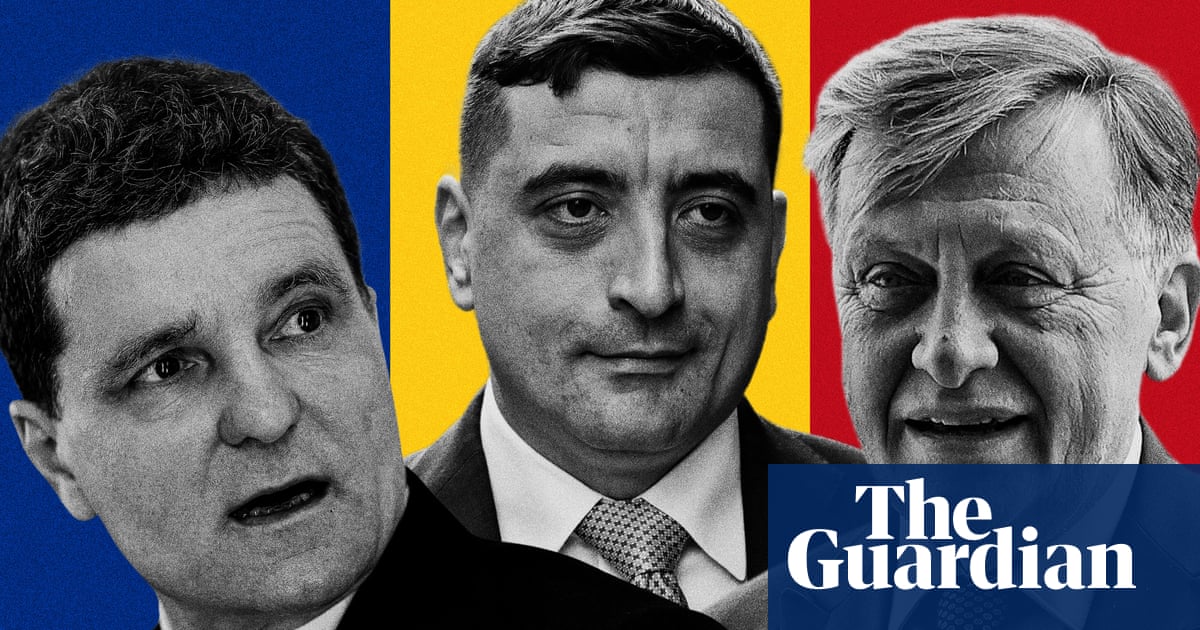Romania returns to the polls in May for a rerun of its crunch presidential election after the original vote last year was annulled – and its shock far-right winner disbarred – amid widespread concerns over Russian interference and other irregularities.
With another far-right candidate ahead in the polls, the vote is being watched from Brussels to Washington: a nationalist victory could result in the EU and Nato member, which borders Ukraine, veering from a pro-European path. The Trump administration, meanwhile, has accused Bucharest of overturning democracy.
The first round of Romania’s presidential election last November waswon by Călin Georgescu, a far-right, anti-EU, Moscow-friendly independent who surged from less than 5% days before the vote to 23%, finishing well ahead of both pre-vote frontrunners.
Declassified intelligence documents revealed the hallmarks of a possible Russian influence operation, identifying 85,000-plus cyber-attacks on the election computer system and 25,000 previously dormant TikTok accounts that had amplified Georgescu’s messages.
Thefiles suggestedsocial media influencers had been hired by intermediaries and paid to share videos promoting Georgescu, who declared zero campaign spending, and that some of his campaign workers were linked to organised crime gangs and neofascist groups.
The election was annulleda fortnight later and in February the former soil scientist wasplaced under investigationon six counts including misreporting campaign finances, illegal use of digital technology and promoting fascist groups. He has denied wrongdoing.
In MarchRomania’s top court upheld a decisionto ban Georgescu from standing in the rerun of the vote in May, leaving the country’s far-right parties – which hold more than a third of the seats in parliament – just days to find a presidential candidate.
Opinion polls – which are not especially reliable in Romania, and signally failed to spot Georgescu’s late surge – suggest four candidates have a chance of finishing in the top two of the 4 May first round and advancing to the second-round runoff on 18 May.
They are headed by George Simion, leader of Romania’s second-largest party, the far-right Alliance for the Union of Romanians (AUR), who has pitched himself as a force for change, is fiercely critical of the EU’s leadership and aims to stop military aid to Ukraine.
Romania’s ultranationalist forces have united behind Simion, 38, who is averaging about 29% in the polls. He has called the cancelled election a coup and his party, which began during Covid as an anti-vaxx movement, the “natural allies” of Trump’s Maga Republicans.
He has opposed gay marriage and introducing dedicated Holocaust lessons in schools, is barred from Moldova and Ukraine after supporting a return to Romania’s pre-1939 borders, but has moderated his pro-Moscow views and denies accusations he met Russian spies.
Behind Simion are the candidate of the governing Social Democratic party (PSD) and National Liberal Party (PNL), Crin Antonescu (22%), and the centrist Bucharest mayor, Nicușor Dan (20%), both of whom support EU and Nato membership and aid to Ukraine.
Trailing on about 14% is Victor Ponta, a former PSD prime minister who resigned in 2015 after a deadly nightclub fire led to huge anti-corruption protests. He has since adopted an ultranationalist discourse, while still backing Romania’s EU and Nato commitments.
Elena Lasconi of the reformist Save Romania Union (USR), who finished second behind Georgescu in November’s cancelled vote, is staying in the race despite her party’s decision to back Dan – who is running as an independent – instead of her, but is polling at barely 8%.
For what they are worth, polls predict Simion, popular among rural and working-class voters, would beat Dan, whose electorate is largely in Bucharest and other urban centres, in a hypothetical run-off, but might struggle against the broader appeal of Antonescu.
Any candidate securing more than 50% of all registered votes in the first round is declared the winner. Otherwise, a runoff between the contenders who achieved the two highest first-round scores is won by the candidate with the larger share of the second-round vote.
Romania’s president serves for five years and has a semi-executive role with considerable decision-making powers over foreign policy, national security, defence spending and judicial appointments. He or she also represents the country on the international stage.
Romania’s 7 million-strong diaspora, one of Europe’s largest, is rarely included in polls but casts between 5% and 7% of all ballots. Since 2020 it has been a reliable source of votes for far-right candidates and parties; more than half voted for Georgescu in November.
Voters are fed up with the mainstream politicians who have run Romania since the 1989 fall of Communism, and their vote is increasingly likely to reflect what analystValentin Naumescucalled their “frustrations, revolt and anger towards the system”.
Median household income is a third of the EU average; food is 50% more expensive than five years ago; almost a third of the country’s 19 million people are at risk of poverty and social exclusion; nearly 20% of the workforce has sought better opportunities abroad.
Public services are poor, inequality high, a long history of corrupt and incompetent politicianshas left public trust in MPs and ministers low. The war in Ukraine is also a major topic, especially for far-right voters who object to Romania’s continued backing of Kyiv.
The vote matters abroad because the EU does not want another disruptive, sovereignist figure in the region alongside Hungary and Slovakia, and Ukraine’s western allies would prefer Romania, which hosts a bigNato military base, to remain a strategic ally.
The Trump administration, which has accused Bucharest of trampling on free speech and suppressing political opponents, is also watching. JD Vance has askedif Romania “shares America’s values”, and Elon Musk has asked how a judge can “end democracy in Romania”.
